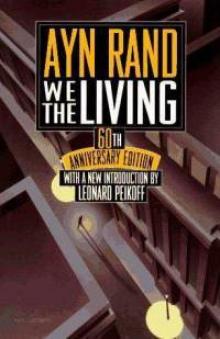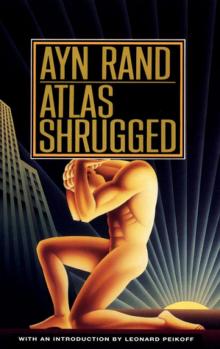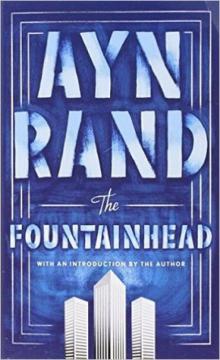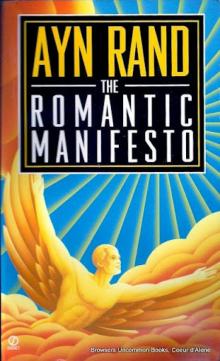We the Living Read online
Page 2
For those readers who have expressed a personal curiosity about me, I want to say that We the Living is as near to an autobiography as I will ever write. It is not an autobiography in the literal, but only in the intellectual, sense. The plot is invented; the background is not. As a writer of the Romantic school, I would never be willing to transcribe a "real life" story, which would amount to evading the most important and most difficult part of creative writing: the construction of a plot. Besides, it would bore me to death. My view of what a good autobiography should be is contained in the title that Louis H. Sullivan gave to the story of his life: The Autobiography of an Idea. It is only in this sense that We the Living is my autobiography and that Kira, the heroine, is me. I was born in Russia, I was educated under the Soviets, I have seen the conditions of existence that I describe. The particulars of Kira's story were not mine; I did not study engineering, as she did--I studied history; I did not want to build bridges--I wanted to write; her physical appearance bears no resemblance to mine, neither does her family. The specific events of Kira's life were not mine; her ideas, her convictions, her values were and are.
--Ayn Rand
New York, October 1958
PART ONE
I
PETROGRAD SMELT OF CARBOLIC ACID.
A pinkish-gray banner that had been red, hung in the webbing of steel beams. Tall girders rose to a roof of glass panes gray as the steel with the dust and wind of many years; some of the panes were broken, pierced by forgotten shots, sharp edges gaping upon a sky gray as the glass. Under the banner hung a fringe of cobwebs; under the cobwebs--a huge railway clock with black figures on a yellow face and no hands. Under the clock, a crowd of pale faces and greasy overcoats waited for the train.
Kira Argounova entered Petrograd on the threshold of a box car. She stood straight, motionless, with the graceful indifference of a traveler on a luxurious ocean liner, with an old blue suit of faded cloth, with slender, sunburned legs and no stockings. She had an old piece of plaid silk around her neck, and short tousled hair, and a stockingcap with a bright yellow tassel. She had a calm mouth and slightly widened eyes with the defiant, enraptured, solemnly and fearfully expectant look of a warrior who is entering a strange city and is not quite sure whether he is entering it as a conqueror or a captive.
Behind her was a car overloaded with a freight of humans and bundles. The bundles were wrapped in bed-sheets, newspapers and flour sacks. The humans were bundled in ragged overcoats and shawls. The bundles had served as beds and had lost all shape. Dust had engraved wrinkles on the dry, cracked skin of faces that had lost all expression.
Slowly, wearily, the train pulled to a stop, the last one of a long journey across the devastated plains of Russia. It had taken two weeks to make a three days' trip--from the Crimea to Petrograd. In 1922 the railroads, as well as everything else, had not as yet been organized. The civil war had come to an end. The last traces of the White Army had been wiped out. But as the hand of the Red rule was bridling the country, the net of steel rails and telegraph wires still hung limply, out of the hand's grasp.
There were no schedules, no time-tables. No one knew when a train would leave or arrive. A vague rumor that it was coming rushed a mob of anxious travelers to the stations of every town along its way. They waited for hours, for days, afraid to leave the depot where the train could appear in a minute--or a week. The littered floors of the waiting rooms smelt like their bodies; they put their bundles on the floors, and their bodies on the bundles, and slept. They munched patiently dry crusts of bread and sunflower seeds; they did not undress for weeks. When at last, snorting and groaning, the train rumbled in, men besieged it with fists and feet and ferocious despair. Like barnacles, they clung to the steps, to the buffers, to the roofs. They lost their luggage and their children; without bell or notice the train started suddenly, carrying away those who had crawled aboard.
Kira Argounova had not started the journey in a box car. At the start, she had had a choice seat: the little table at the window of a third-class passenger coach; the little table was the center of the compartment, and Kira--the center of the passengers' attention. A young Soviet official admired the line that the silhouette of her body made against the light square of a broken window. A fat lady in a fur coat was indignant that the girl's defiant posture somehow suggested a cabaret dancer perched among champagne glasses, but a dancer with a face of such severe, arrogant calm, that the lady wondered whether she was really thinking of a cabaret table or a pedestal. For many long miles, the travelers of that compartment watched the fields and prairies of Russia roll by as a background for a haughty profile with a mass of brown hair thrown off a high forehead by the wind that whistled outside in the telegraph wires.
For lack of space Kira's feet rested on her father's lap. Alexander Dimitrievitch Argounov slumped wearily in his corner, his stomach a shelf for his folded hands, his red, puffed eyes half-closed, drowsing, jerking himself up with a sigh once in a while when he caught his mouth hanging open. He wore a patched khaki overcoat, high peasant boots with run-down heels and a burlap shirt on the back of which one could still read: "Ukrainian Potatoes." This was not an intentional disguise; it was all Alexander Dimitrievitch possessed. But he was greatly worried lest someone should notice that the rim of his pince-nez was of real gold.
Crushed against his elbow, Galina Petrovna, his wife, managed to hold her body erect and her book high to the tip of her nose. She had kept her book, but lost all her hairpins in the flight for seats, when her efforts had secured the family's entrance into the car. She was careful not to let her fellow travelers observe that her book was French.
Once in a while her foot felt cautiously under the seat to make certain that her best bundle was still there, the one wrapped in the cross-stitch embroidered table cloth. That bundle held the last remnants of her hand-made lace underwear, purchased in Vienna before the war, and the silverware with the Argounov family initials. She greatly resented, but could not prevent the fact that the bundle served as a pillow for a snoring soldier who slept under the bench, his boots protruding into the aisle.
Lydia, the Argounovs' elder daughter, had to sit in the aisle, next to the boots, on a bundle; but she made it a point to let every passenger in the car understand that she was not used to such mode of traveling. Lydia did not condescend to hide outward signs of social superiority, of which she proudly displayed three: a jabot of tarnished gold lace on her faded velvet suit, a pair of meticulously darned silk gloves and a bottle of eau-de-cologne. She took the bottle out at rare intervals to rub a few drops on her carefully groomed hands, and hid it promptly, noticing the sidewise, yearning glance of her mother from behind the French novel.
It had been four years since the Argounov family left Petrograd. Four years ago Argounov's textile factory on the outskirts of the capital was nationalized in the name of the people. In the name of the people the banks were declared national property. Argounov's safe-deposit boxes were broken open and emptied. The luminous collars of rubies and diamonds, which Galina Petrovna paraded proudly in sparkling ball-rooms and kept prudently locked afterwards, passed into unknown hands, never to be seen again.
In the days when the shadow of a growing, nameless fear descended upon the city, hanging like a heavy mist on unlighted street corners, when sudden shots rang in the night, trucks bristling with bayonets rumbled down the cobblestones, and store windows crashed with a sonorous ringing of glass; when the members of the Argounovs' social set suddenly melted away, like snowdrops over a bonfire; when the Argounov family found themselves in the halls of their stately granite mansion, with a considerable sum of cash, a few last pieces of jewelry, and a constant terror at every sound of the door bell--a flight from the city stood before them as their only course of action.
In those days the thunder of the revolutionary struggle had died in Petrograd, in the resigned hopelessness of Red victory, but in the south of Russia it still roared on the fields of civil war. The south was in the hands
of the White Army. That army was thrown in disjoined troops across the vast country, divided by miles of broken railroad tracks and unknown, desolated villages; that army carried three-colored banners, an impatient, bewildered contempt of the enemy--and no realization of his importance.
The Argounovs left Petrograd for the Crimea, there to await the capital's liberation from the Red yoke. Behind them, they left drawing rooms with tall mirrors reflecting blazing crystal chandeliers; perfumed furs and thoroughbred horses on sunny winter mornings; plate-glass windows that opened on the avenue of stately mansions, the Kamenostrovsky, Petrograd's exclusive thorough-fare. They met four years of crowded summer shacks where piercing Crimean winds whistled through porous stone walls; of tea with saccharine, and onions fried in linseed oil; of nightly bombardments and fearful mornings when only the red flags or the three-colored banners in the streets announced into whose hands the town had passed.
The Crimea changed hands six times. Nineteen twenty-one saw the end of the struggle. From the shores of the White Sea to those of the Black, from the border of Poland to the yellow rivers of China, the red banner rose triumphantly to the sound of the "Internationale" and the clicking of keys, as the world's doors closed on Russia.
The Argounovs had left Petrograd in autumn, calmly and almost cheerfully. They had considered their trip an unpleasant, but short annoyance. They had expected to be back in the spring. Galina Petrovna had not allowed Alexander Dimitrievitch to take a winter fur coat along. "Why, he thinks it's going to last a year!" she had laughed, referring to the Soviet government.
It had lasted five years. In 1922, with a silent, dull resignation, the family took the train back to Petrograd, to start life all over again, if a start were still possible.
When they were in the train and the wheels screeched and tore forward for the first time, in that first jerk toward Petrograd, they looked at one another, but said nothing. Galina Petrovna was thinking of their mansion on Kamenostrovsky and whether they could get it back; Lydia was thinking of the old church where she had knelt every Easter of her childhood, and that she would visit it on her first day in Petrograd; Alexander Dimitrievitch was not thinking; Kira remembered suddenly that when she went to the theater, her favorite moment was the one when the lights went out and the curtain shivered before rising; and she wondered why she was thinking of that moment.
Kira's table was between two wooden benches. Ten heads faced one another--like two tense, hostile walls, swaying as the train rocked--ten weary, dusty white spots in the semi-darkness: Alexander Dimitrievitch and the faint glint of his gold pince-nez, Galina Petrovna, her face whiter than the white pages of her book, a young Soviet official with glimmers of light in his new leather brief case, a bearded peasant in a smelly sheepskin coat, who scratched himself continuously, a haggard woman with sagging breasts, who was counting constantly, hysterically her packages and children; and facing them--two of the bare-footed, uncombed children, and a soldier, his head bent, his yellow bast shoes resting on the alligator suitcase of a fat lady in a fur coat, the only passenger with a suitcase and with pink, glossy cheeks, and next to her the sallow, freckled face of a dissatisfied woman with a man's jacket, bad teeth and a red kerchief on her hair.
Through the broken window, a ray of light came in over Kira's head. Dust danced in the ray and it stopped on three pairs of boots swinging down from the upper berth where three soldiers huddled together. Above them, high over the upper berth, a consumptive young fellow was curled on the baggage rack, his chest crushed against the ceiling, asleep, snoring raucously, breathing with effort. Under the travelers' feet the wheels knocked as if a load of rusty iron crashed and then splinters rolled, clattering down three steps, and another crash and splinters clattering, and another crash and splinters clattering, and over the travelers' heads a man's breath whistled like air hissing out of a punctured balloon; the man stopped at times to moan weakly; the wheels went on clattering.
Kira was eighteen years old and she thought of Petrograd.
The faces around her spoke of Petrograd. She did not know whether the sentences hissed into the dusty air were spoken in one hour, or one day, or through the two weeks in the rocking haze of dust, sweat and fear. She did not remember--because she did not listen.
"In Petrograd they have dried fish, citizens."
"And sunflower-seed oil."
"Sunflower-seed oil! Not real?"
"Stepka, don't scratch your head at me, scratch in the aisle! . . . At our co-operative in Petrograd, they gave potatoes. A bit frozen, but real potatoes."
"Have you ever tried pancakes of coffee grounds with treacle, citizens?"
"Mud up to your knees, in Petrograd."
"You stand in line for three hours at the co-operative and maybe you get food."
"But they have NEP in Petrograd."
"What's that?"
"Never heard? You're not a conscientious citizen."
"Yes, comrades, Petrograd and NEP and private stores."
"But if you're not a speculator, you'll starve, but if you are, you can go in and buy anything you want, but if you buy you're a speculator, and then look out, but if you're not a speculator you have no money for a private store and then you stand in line at the co-operative."
"At the co-operative they give millet."
"Empty bellies are empty bellies with everybody but the lice."
"You stop scratching, citizen."
Someone on the upper berth said: "I'd like buckwheat porridge when I get to Petrograd."
"Oh, Lord," sighed the lady in the fur coat, "if I could have a bath, a nice, hot bath with soap when I get to Petrograd."
"Citizens," Lydia asked boldly, "do they have ice-cream in Petrograd? I haven't tasted it for five years. Real ice-cream, cold, so cold it takes your breath away. . . ."
"Yes," said Kira, "so cold it takes your breath away, but then you can walk faster, and there are lights, a long line of lights, moving past you as you walk."
"What are you talking about?" asked Lydia.
"Why, about Petrograd." Kira looked at her, surprised. "I thought you were talking about Petrograd, and how cold it was there, weren't you?"
"We were not. You're off--as usual."
"I was thinking about the streets. The streets of a big city where so much is possible and so many things can happen to you."
Galina Petrovna remarked dryly: "You're saying that quite happily, aren't you? I should think we'd all be quite tired of 'things happening,' by now. Haven't you had enough happen to you with the revolution, and all?"
"Oh, yes," said Kira indifferently, "the revolution."
The woman in the red kerchief opened a package and produced a piece of dried fish, and said to the upper berth: "Kindly take your boots away, citizen. I'm eating."
The boots did not move. A voice answered: "You don't eat with your nose."
The woman bit into the fish and her elbow poked furiously into the fur coat of her neighbor, and she said: "Sure, no consideration for us proletarians. It's not like as if I had a fur coat on. Only I wouldn't be eating dried fish then. I'd be eating white bread."
"White bread?" The lady in the fur coat was frightened. "Why, citizen, who ever heard of white bread? Why, I have a nephew in the Red Army, citizen, and . . . and, why, I wouldn't dream of white bread!"
"No? I bet you wouldn't eat dry fish, though. Want a piece?"
"Why . . . why, yes, thank you, citizen. I'm a little hungry and. . . ."
"So? You are? I know you bourgeois. You're only too glad to get the last bite out of a toiler's mouth. But not out of my mouth, you don't!"
The car smelt of rotting wood, clothes that had not been changed for weeks and the odor coming from a little door open at the end of the coach.
The lady in the fur coat got up and made her way timidly toward that door, stepping over the bodies in the aisle.
"Could you please step out for a moment, citizens?" she asked humbly of the two gentlemen who were traveling comfortably in that l
ittle private compartment, one of them on the seat, the other stretched in the filth of the floor.
"Certainly, citizen," the one who was sitting answered politely and kicked the one on the floor to awaken him.
Left alone where no one could watch her, the lady in the fur coat opened her handbag furtively and unwrapped a little bundle of oiled paper. She did not want anyone in the car to know that she had a whole boiled potato. She ate hurriedly in big, hysterical bites, choking, trying not to be heard beyond the closed door.
When she came out, she found the two gentlemen waiting by the door to retrieve their seats.
At night, two smoked lanterns trembled over the car, one at each end, over the doors, two shivering yellow spots in the darkness, with a gray night sky shaking in the squares of broken windows. Black figures, stiff and limp as dummies, swayed to the clatter of the wheels, asleep in sitting postures. Some snored. Some moaned. No one spoke.
When they passed a station, a ray of light swept across the car, and against the light Kira's figure flashed for a second, bent, her face in her lap on folded arms, her hair hanging down, the light setting sparks in the hair, then dying again.
Somewhere in the train, a soldier had an accordion. He sang, hour after hour, through the darkness, the wheels and the moans, dully, persistently, hopelessly. No one could tell whether his song was gay or sad, a joke or an immortal monument; it was the first song of the revolution, risen from nowhere, gay, reckless, bitter, impudent, sung by millions of voices, echoing against train roofs, and village roads, and dark city pavements, some voices laughing, some voices wailing, a people laughing at its own sorrow, the song of the revolution, written on no banner, but in every weary throat, the "Song of the Little Apple."

 Anthem
Anthem We the Living
We the Living Atlas Shrugged
Atlas Shrugged The Fountainhead
The Fountainhead The Romantic Manifesto: A Philosophy of Literature
The Romantic Manifesto: A Philosophy of Literature The Classic Sci-Fi Collection
The Classic Sci-Fi Collection The Early Ayn Rand
The Early Ayn Rand